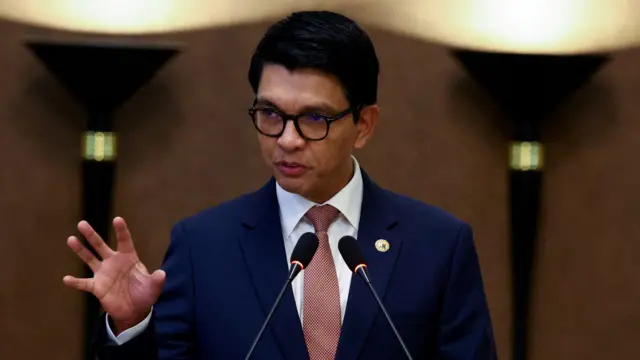Madagascar’s President Andry Rajoelina has taken refuge in a secure location after revealing an alleged assassination attempt against him.
In a live social media broadcast, the 51-year-old leader claimed that a group of military personnel and politicians plotted to kill him, escalating weeks of protests demanding his resignation.
A Nation in Turmoil
For two weeks, young protesters, dubbed “Gen Z Mada,” have led nationwide demonstrations calling for Rajoelina’s ouster.
Frustrated by frequent power and water shortages, high unemployment, and rising living costs, the youth have accused the government of corruption and mismanagement. Efforts to quell the unrest, including dismissing the entire cabinet, failed to calm the crowds.
Rajoelina, absent from public view since last Wednesday, addressed the nation amid reports of soldiers threatening to seize state television headquarters.
“Since September 25, there have been coup attempts and threats to my life,” he said. “I had to find a safe place to protect myself.” He urged adherence to the country’s constitution to resolve the crisis.
Military Shifts and Political Tension
Over the weekend, the powerful CAPSAT army unit, instrumental in Rajoelina’s 2009 rise to power, declared itself in control of Madagascar’s armed forces.
Some officers joined protesters in the capital, Antananarivo, signaling a fracture in military loyalty.
On Monday, newly appointed Chief of Army Staff General Demosthene Pikulas worked to restore order, appearing at the state TV station to address the crisis.
A senior figure from the opposition TIM party, speaking anonymously, claimed the army unit now effectively governs the country.
The party plans to pursue impeachment proceedings against Rajoelina, accusing him of abandoning his post.
Several of Rajoelina’s allies, including the former prime minister and a prominent businessman, have reportedly fled to Mauritius.
International Reactions
Foreign leaders have called for stability. France’s President emphasized the need to preserve Madagascar’s constitutional order, praising the youth’s activism but warning against military overreach or foreign interference.
The African Union’s security council echoed this, rejecting any unconstitutional power changes.
Roots of the Unrest
Madagascar, rich in natural resources, remains one of the world’s poorest nations, with over 75% of its population living below the poverty line and only a third accessing electricity.
The protests, initially sparked by utility outages, grew into broader demands for economic reform and accountability.
Reports indicate at least 22 deaths and over 100 injuries in the unrest’s early days, with security forces allegedly using live ammunition and tear gas, causing harm, including the death of a newborn from smoke inhalation. The government disputes these casualty figures.
Rajoelina’s Controversial Leadership
Rajoelina, a former entrepreneur and DJ, became Africa’s youngest leader at 34 in 2009 after protests ousted his predecessor.
He governed until 2013 and returned to power in 2018. Despite early popularity, allegations of corruption and favoritism have tarnished his reputation, fueling the current unrest.






